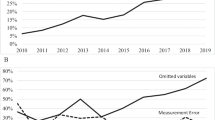Summary
Six issues are raised. First, what determines the distributive shares? Second, could propensities to consume wages and profits differ in a neoclassical model? Third, how is the equality of savings and investment established? Fourth, does the neoclassical model have an investment function? Fifth, will the neoclassical one-good parable do, or is it necessary to deal with heterogeneous capital? Sixth, if necessary, could the neoclassical model be generalized to do so in a meaningful and an operational way? The answer to the last question is that it can, and the article suggests how.
Similar content being viewed by others
References
Bergström, V., ‘Industriell utveckling, industrins kapitallbildning och finanspolitiken,’ inSvensk finanspolitik i teori och praktik, edited by E. Lundberg, Stockholm, 1971.
Brems, H.,Labor, Capital, and Growth, Lexington, Mass., Toronto, London, 1973.
Brems, H., ‘Er ørkonomisk vœkst blevet umoderne?,’Nationaløkonomisk Tidsskrift, CXII (1974), pp. 230–248.
Graham, F. D., ‘The Theory of International Value Re-Examined,’Quarterly Journal of Economics, XXXVIII (1923), pp. 54–86.
Kravis, I. B., ‘Relative Income Shares in Fact and Theory,’American Economic Review, IL (1959, pp. 917–949.
Additional information
Professor of Economics, University of Illinois at Urbana-Champaign, visiting professor at the universities of Copenhagen and Lund, spring of 1975.
Rights and permissions
About this article
Cite this article
Brems, H. The capital controversy: A Cambridge, Massachusetts View of Cambridge, England. De Economist 123, 369–384 (1975). https://doi.org/10.1007/BF02115744
Published:
Issue Date:
DOI: https://doi.org/10.1007/BF02115744




